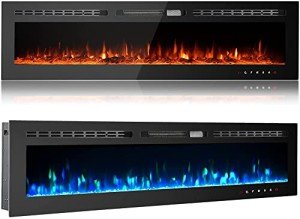
Buy Fireplaces
FollowOverview
-
Founded Date 22 June 1950
-
Sectors Creative and Design
-
Posted Jobs 0
-
Viewed 4
Company Description
15 Weird Hobbies That Will Make You Better At Best Fireplace
The Best Fireplaces: A Comprehensive Guide for Homeowners
Fireplaces have actually long been a cherished feature in homes, supplying both warmth and an inviting environment. They come in various styles, sizes, and fuel types, allowing homeowners to select one that fits their individual aesthetic and heating requirements. This article explores the very best fireplaces, highlighting crucial features and considerations to assist you make a notified choice.

Kinds of Fireplaces
Comprehending the different kinds of fireplaces is essential in selecting the best alternative for your home. Below are the most frequently used fireplaces:
-
Wood-Burning Fireplaces
- Benefits: Traditional appeal, natural atmosphere, and effective heating.
- Downsides: Requires routine maintenance, ash disposal, and is subject to local guidelines concerning emissions.
-
Gas Fireplaces
- Benefits: Convenient, clean-burning, and simple to operate.
- Disadvantages: Requires a gas line, can be more expensive to set up initially.
-
Electric Fireplaces
- Advantages: Easy setup, low maintenance, and the best alternative for homes with kids or pets.
- Disadvantages: Lack the genuine feel of wood or gas flames, may not heat large spaces efficiently.
-
Pellet Stoves
- Advantages: Eco-friendly, efficient, and offer a constant heat output.
- Disadvantages: Requires electrical power to operate, and pellet supply can be restricted in some areas.
-
Ethanol Fireplaces
- Benefits: No chimney needed, portable, and ecologically friendly.
- Downsides: Generally less efficient for heating.
A Comparison of Fireplace Types
| Type | Setup Cost | Running Cost | Heat Output | Maintenance | Environmental Impact |
|---|---|---|---|---|---|
| Wood-Burning | ₤ ₤ | ₤ | High | High | Moderate |
| Gas | ₤ ₤ ₤ | ₤ ₤ | Medium-High | Low | Moderate |
| Electric | ₤ | ₤ ₤ | Low | Very Low | Low |
| Pellet | ₤ ₤ | ₤ | Medium | Medium | Low |
| Ethanol | ₤ ₤ | ₤ ₤ ₤ | Low | Very Low | Really Low |
Leading Considerations When Choosing a Fireplace
When you’re in the marketplace for a new fireplace, keep the list below elements in mind to guarantee you select the very best one for your home:
-
Purpose and Functionality: What do you want your fireplace to do? Is it for heating or visual appeals? This will guide your option considerably.
-
Space Availability: Measure the area where you want to install the fireplace. Guarantee the selected type fits without frustrating the area.
-
Fuel Source: Assess the accessibility and expense of different fuel sources in your area to avoid unexpected expenditures.
-
Setup Complexity: Some fireplaces might require substantial modifications to your existing home structure.
-
Building Codes and Regulations: Be mindful of regional laws regarding ventilation, security, and emissions, as these can influence your fireplace option.
-
Visual Appeal: The design and design of a fireplace can serve as a centerpiece or complement the existing decor, so choose one that improves your home’s general visual.
Advantages of a Fireplace
Including a fireplace to your home manages many advantages:
-
Enhanced Aesthetic Appeal: A fireplace can raise the decor of any room, developing a cozy and welcoming environment.
-
Increased Home Value: A well-installed fireplace can add considerable value to your home, making it appealing to prospective buyers.
-
Energy Efficiency: Modern fireplaces, specifically gas and pellet ranges, can supply reliable heating while lowering energy costs.
-
Emergency Situation Heat Source: In cases of power outages, a wood or gas fireplace can function as a reputable heat source.
-
Celebration Space: Fireplaces often end up being the focal point for events, promoting warmth and convenience throughout friend or family’ get-togethers.

Frequently Asked Questions (FAQs)
Q: How much does it cost to set up a fireplace?A: Installation costs can vary substantially based upon the kind of fireplace, structural requirements, and labor expenses. Standard electric fireplaces may cost around ₤ 300, while custom-made wood or gas fireplaces can run from ₤ 3,000 to upwards of ₤ 10,000. Q: Are electric fireplaces safe?A: Yes, electric
fireplaces are typically safe.
They do not release carbon monoxide and have no open flames. They typically include safety features like automatic shut-off systems. Q: How typically must I have my chimney cleaned?A: If you utilize a wood-burning fireplace, it’s suggested to have your chimney cleaned at least once a year
to prevent creosote buildup, which can result in chimney fires. Q: Can I install a gas fireplace myself?A: It’s not suggested to set up a gas fireplace without expert help due to the intricacies related to gas
lines, ventilation, and security guidelines. Q: What are the best types of fuel for wood-burning fireplaces?A: The best fuel options include well-seasoned woods like oak, maple, or hickory, as they burn hotter and cleaner compared to softwoods. Picking the very best fireplace for your home
involves considering numerous factors, from looks to function and security. Each kind of fireplace has its special benefits and possible drawbacks.
Comprehending these aspects, in addition to your personal heating requirements and budget constraints, will guide you in making an informed decision. Ultimately, a fireplace can offer not just warmth but also an abundant ambiance, transforming your home into a welcoming sanctuary.


